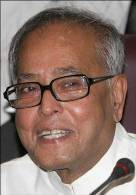 One joke about Bollywood endings, one quote from Kautilya, but para after para of 1980s-style sector-specific duty exemptions made finance minister Pranab Mukherjee's budget speech a rather dull affair, but for the noisy interlude provided by a united Opposition that was determined to play spoilsport.
One joke about Bollywood endings, one quote from Kautilya, but para after para of 1980s-style sector-specific duty exemptions made finance minister Pranab Mukherjee's budget speech a rather dull affair, but for the noisy interlude provided by a united Opposition that was determined to play spoilsport.
The dullness was, however, understandable since Budget 2010-11 was almost along predictable lines.
The fiscal deficit to GDP ratio was brought down to exactly the level the finance minister had promised: 5.5 percent, not a decimal point less or more; the excise duty rates were hiked by 2 percentage points, as we first reported they would be in the columns of this newspaper; not much tinkering with customs duties, despite the Economic Survey's suggestion that the peak rate be brought down to 7.5 per cent; and, a series of plans and schemes aimed at making the growth process more inclusive.
While Mr Mukherjee has earned his brownie points on fiscal deficit reduction, his social sector spending plans have meant that the revenue deficit still remains at around 4 percent of GDP, a fact that he surprisingly did not mention in his speech.
Indeed, this may well be the first budget speech to have omitted any reference to the revenue deficit number!
If there was one surprise, and for many a welcome one, it was the hefty Rs 26,000-crore direct tax give-away to an inflation-stressed salary earning urban middle class. This unexpected concession would not only find favour with a vocal urban middle class, but could also contribute to higher household savings.It is a pity that the minister did not choose to introduce a comprehensive services tax this year and experiment with its rollout in time for the goods and services tax next year. Apart from the revenues he hopes to garner through higher excise duty and services tax, Mr Mukherhjee also hopes to bridge the deficit by selling public sector stock and auctioning 3G telecom licences.
Fiscal purists may quarrel with this strategy but Mr Mukherjee will argue he is keeping faith by his promise to keep his date with the introduction of a new direct taxes code and the rollout of GST. He has also promised to simplify tax administration and widen the tax base through better compliance at reasonable rates.
The only jarring aspect of the tax proposals is the multitude of tax exemptions. Why magnetrons used in microwave ovens and toy balloons should attract the specific generosity of the finance minister is not very clear!
The finance minister is right to regard fiscal consolidation, improving the policy environment for investment and turning the agricultural economy around as necessary elements of consolidating the growth process.
Going beyond his tax and spending proposals, the budget speech also proposes some well considered and much needed reforms in the energy, agricultural and social sectors.
The idea of setting up a Coal Regulatory Authority, with competitive bidding for coal block allocation, is a good reform step. The national social security fund for unorganised sector workers is also a welcome measure.
It is clear that few in government can resist the temptation of creating more committees, authority and funds. So the finance minister must be excused for announcing the creation of one council, one authority, one commission and two funds.
Hopefully, though, his Financial Stability and Development Council will not devalue the institution of the central bank. In fact the governor of the Reserve Bank of India should chair this council, if at all such a council is really needed.
The FSDC should not become an instrument to weaken central bank authority. The idea of cleaning up the legal infrastructure of the financial sector, a job that the proposed Financial Sector Legislative Reforms Commission will be asked to do, is a welcome proposal.
The paradox of Mr Mukherjee's budgetary strategy this year is that while it meets almost all expectations, of markets, businesses, households and investors, it falls short of what was, both politically and economically, warranted, desirable, and indeed, even feasible.
After a long time a ruling coalition finds itself relatively secure, even if the opposition has become suddenly belligerent, and there are no elections around the corner.
This was the year for some big picture stuff, some daring reform initiatives, and not just the kind of risk-averse incrementalism we saw. Mr Mukherjee has presented a good budget, perhaps even a very good one under the circumstances, but he has shied away from presenting a great budget.
One that he would be remembered by in years to come, like Dr Manmohan Singh's 1991 'reforms budget' and Mr P Chidambaram's 1997 'dream budget'. Good housekeeping is very important, and that is what a good finance ministry does. But, as every housewife knows, good housekeeping doesn't get you into the history books.






